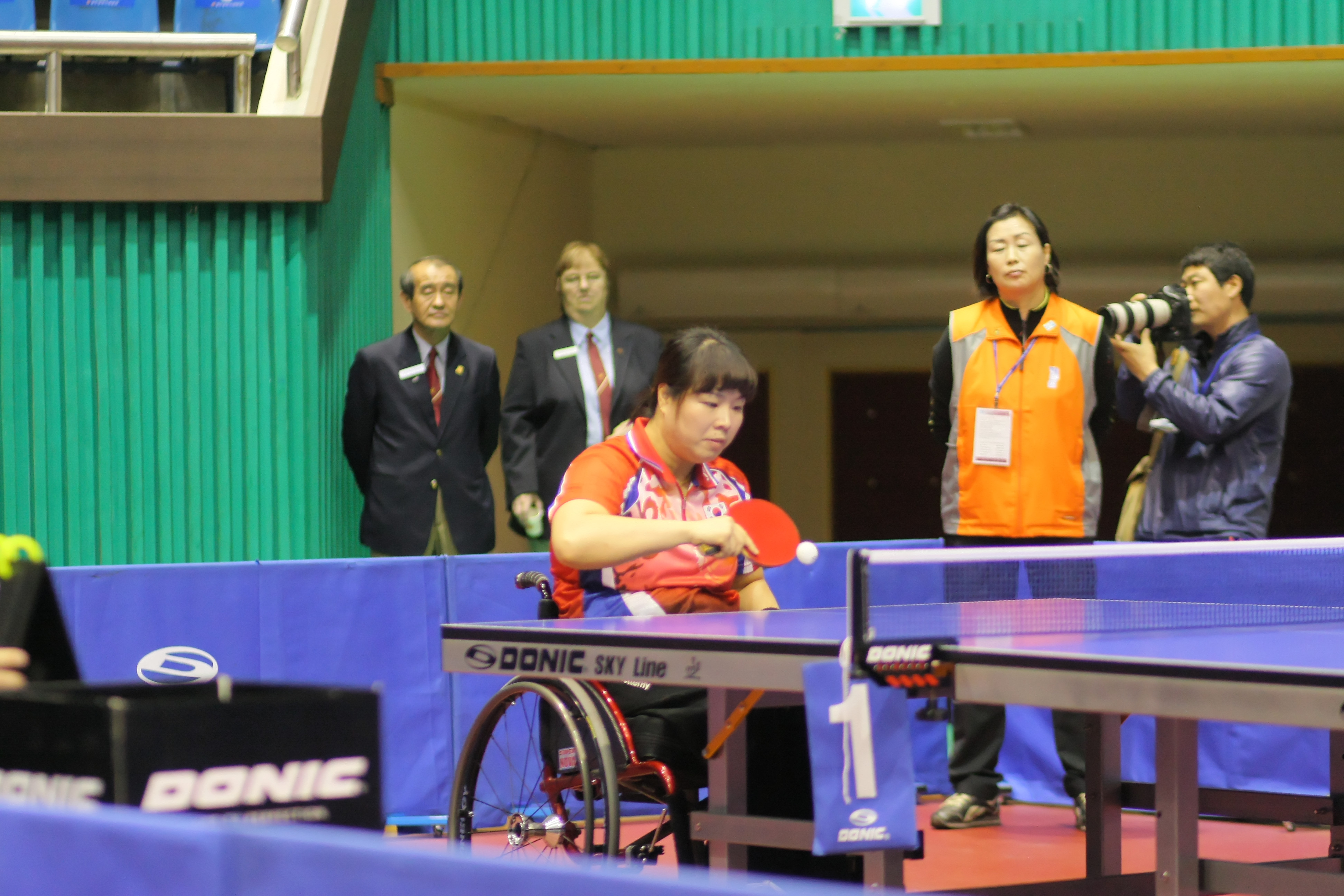1. Early Life and Personal Background
Jung Sang-sook's early life was centered in Gyeonggi Province, where she faced a life-altering event during her high school years that led to her disability.
1.1. Birth and Early Childhood
Jung Sang-sook was born on February 26, 1980, in Siheung, a city located in Gyeonggi Province, South Korea. Details about her immediate family background and childhood environment are limited, but her formative years were spent in this region.
1.2. High School Accident and Disability
During her time in high school, Jung Sang-sook was involved in an accident that resulted in her acquiring a disability. This event significantly altered the course of her life, leading her to navigate new challenges and eventually discover the sport of para table tennis as a path forward.
2. Para Table Tennis Career
Jung Sang-sook embarked on her para table tennis journey in 2007, quickly rising through the ranks to become a prominent figure in the sport, achieving numerous medals at major international competitions.
2.1. Start of Playing Career
Jung Sang-sook began playing para table tennis in 2007. Her decision to pursue the sport came several years after her high school accident, marking a new chapter in her life focused on athletic competition and personal achievement. This new endeavor provided her with a platform to channel her resilience and competitive spirit.
2.2. Major Achievements and International Competitions
Jung Sang-sook accumulated a distinguished record in international para table tennis, securing medals at the Paralympic Games, World Championships, and Asian Para Games.

2.2.1. Paralympic Games
One of the pinnacle achievements of Jung Sang-sook's career was winning a silver medal at the 2012 Summer Paralympics held in London. She earned this medal in the table tennis Women's Teams C1-3 event, showcasing her competitive prowess at the highest level of para sports.
2.2.2. World and Asian Championships
Jung Sang-sook's success extended to other major international tournaments, demonstrating her consistent performance against top competitors.
- At the 2010 World Para Table Tennis Championships held in Gwangju, she secured a bronze medal in the Singles C3 event.
- During the 2010 Asian Para Games in Guangzhou, Jung won two medals: a silver in the Teams C1-3 event and a bronze in the Singles C1-3 event.
2.2.3. Other International Competitions
Beyond the major championships, Jung Sang-sook also achieved notable success in other international competitions, further cementing her standing in the sport.
- At the Asian Para Table Tennis Championships in Amman in 2009, she earned a silver medal in Singles C3 and a bronze medal in Teams C1-3.
- She continued her strong performance at the 2011 Asian Para Table Tennis Championships in Hong Kong, where she secured another bronze medal in the Singles C3 event.
2.3. Playing Style and Characteristics
Jung Sang-sook played with a right-handed shakehand grip, a common and versatile grip in table tennis that allows for powerful offensive and defensive play. She competed in Class 3, which is a classification for athletes with spinal cord injury or other impairments that significantly affect the torso and legs, typically requiring players to compete from a wheelchair.
2.4. Ranking and Key Records
Throughout her active career, Jung Sang-sook achieved significant rankings within the international para table tennis community. Her highest world ranking was World No. 5, a position she reached in July 2012. This top-tier ranking reflects her consistent performance and competitive standing among the world's elite para table tennis players in her class.
3. Retirement and Later Life
Jung Sang-sook has since retired from professional para table tennis. While specific details of her activities and life following retirement are not extensively documented, her competitive career concluded, leaving behind a legacy of achievement in the sport.
4. Legacy and Impact
Jung Sang-sook's career has had a profound influence on the field of para sports and has contributed significantly to changing societal perceptions of people with disabilities in South Korea.
4.1. Positive Assessment and Inspiration
Jung Sang-sook's achievements on the international stage have garnered significant positive assessment. Her journey, from acquiring a disability in high school to becoming a Paralympic medalist, is widely regarded as a powerful narrative of overcoming adversity. She has served as an important source of inspiration, not only for individuals with disabilities who may be facing similar challenges but also for the general public, demonstrating the capabilities and determination of para-athletes. Her success has helped to foster greater understanding and empathy for people with disabilities.
4.2. Contribution to Para Sports Development
Through her prominent career and medal-winning performances, Jung Sang-sook made substantial contributions to the development and enhanced status of para table tennis and the broader field of para sports in South Korea. Her visibility and success brought increased attention and recognition to disability sports, advocating for greater support, resources, and opportunities for para-athletes. Her competitive spirit and dedication helped elevate the profile of para sports, encouraging more participation and appreciation from the public and sports organizations alike.